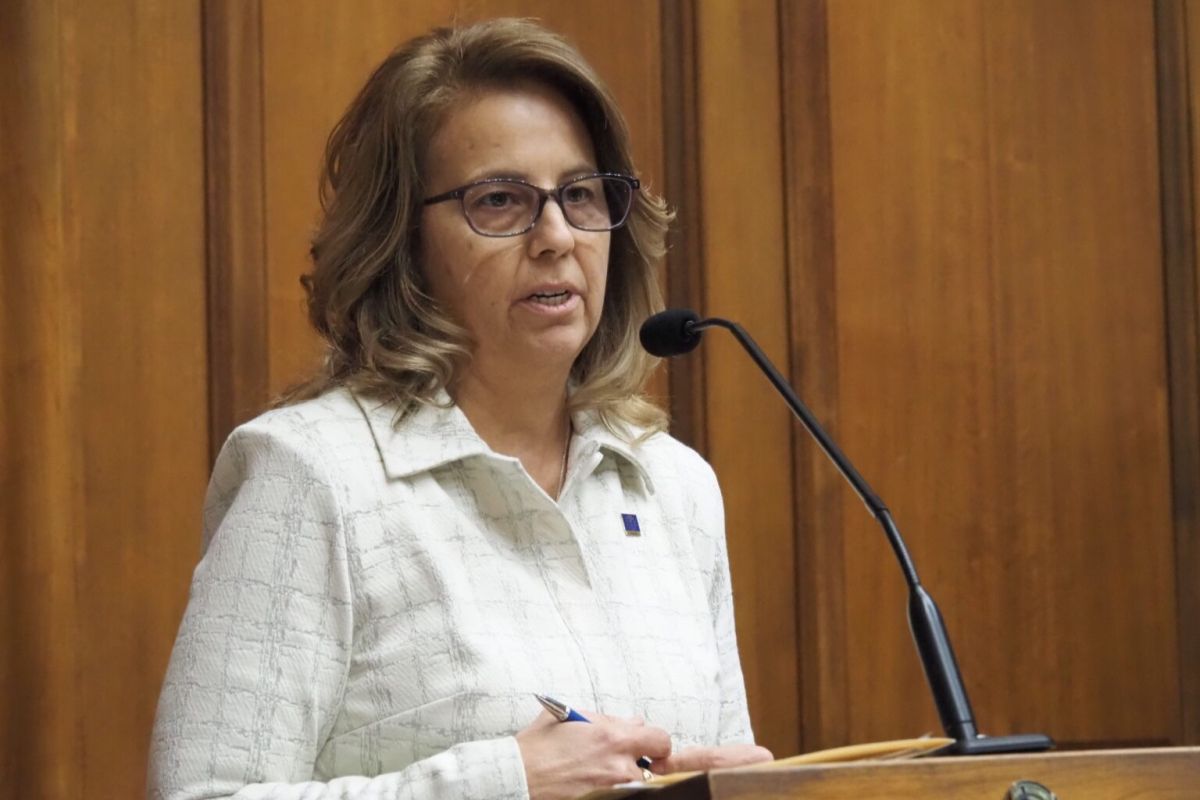
Rep. Michelle Davis, R-Whiteland, speaks before the House Education Committee on Wednesday, Feb. 12, 2025, at the Indiana Statehouse. Up for discussion was her bill to block transgender women from participating in women’s sports at Indiana colleges. (Casey Smith/Indiana Capital Chronicle)
A bill to block transgender women from participating in women’s sports at Indiana colleges advanced from committee with bipartisan support Wednesday and now heads to the full chamber.
House Bill 1041, authored by Republican Rep. Michelle Davis, seeks to expand the state’s previous ban on transgender girls in K-12 sports to college athletics.
The legislation would require all sports teams at Indiana’s public and private colleges to be male, female or coeducational. Athletes who were assigned male at birth would be barred from participating in a “female, women’s, or girls’ team or sport.”
The measure also requires colleges and universities to establish grievance procedures for students or parents to file claims if a team violates the gender restrictions.
Davis described her bill as “common sense legislation that ensures that female athletes are provided with a safe and even playing field at the collegiate level in Indiana.”
“Ensuring fairness in collegiate sports is essential to protecting opportunities for our female athletes. Biological differences impact athletic performance, and House Bill 1041 helps maintain a level playing field,” she said, later adding that, “I think we can all agree that we all think athletics and protecting female sports in Indiana is an appropriate thing to do.”
Although Democrats on the House Education Committee were critical of “virtue signaling” they said surrounded the bill, all but one — Rep. Vernon Smith — ultimately voted in favor.
The proposal passed 12-1 to the House chamber after roughly 90 minutes of discussion and testimony.

Rep. Ed DeLaney, D-Indianapolis, sits in the House Education Committee on Wednesday, Feb. 12, 2025. (Casey Smith/Indiana Capital Chronicle)
“This is a very difficult vote. … I think we’re going about it the wrong way. We’re getting the state involved when the NCAA will do it, but I’m not going to allow us to be misled on this,” explained Rep. Ed DeLaney, D-Indianapolis.
He said he agreed, though, with the “broad principle” of “keep(ing) males out of female sports.”
“I wish we were doing it in a more professional way. I wish we were respecting the NCAA. But if the only option is whether to send a message that we support women, that’s fine,” DeLaney continued. “But I’m not part of the message that we want to belittle people who are having a difficult choice in life as to what they think their sex is.”
Davis authored an earlier bill to ban transgender girls from participating in K-12 sports in 2022.
The earlier legislation passed both chambers but was vetoed by then-Gov. Eric Holcomb, who preferred the Indiana High School Athletic Association’s existing policy around athlete eligibility. The General Assembly voted to overturn the veto, however, putting the language into law.
Although the ban faced numerous legal challenges, a federal appeals court later allowed it to take effect.
Some provisions removed
The bill was amended Wednesday to exclude athletic associations — such as the National Collegiate Athletic Association (NCAA) — from having to comply, and to remove a requirement for out-of-state schools to warn Indiana institutions at least 60 days in advance if one or more athletes on their team is a transgender woman.
Davis said the notification piece “doesn’t make sense.” During tournaments, for example, college teams might not know their opponents until a day or two before the meetup, she noted.
“This puts the onus on our state colleges and our private post-secondaries, that they have to follow this law, not any association (or out-of-state school),” Davis said.
Transgender athletes would not be barred from competing in men’s college sports. But the bill makes clear that “a male, based on a student’s biological sex at birth in accordance with the student’s genetics and reproductive biology, may not participate on an athletic team or sport designated … as being a female, women’s, or girls’ athletic team or sport.”
Still, Davis conceded that Indiana can’t tell schools outside of the state who can play on those teams.

The latest draft additionally allows students and parents to sue schools if a college athlete was injured or “deprived of athletic opportunity” because of a violation.
Davis’ bill explicitly states that schools can not “retaliate or otherwise take any adverse action against a student for reporting a violation or bringing a civil action.”
Last week, President Donald Trump signed an executive order banning transgender girls and women from participating in girls’ sports. Davis was among those who joined Trump at White House for the signing.
Under Trump’s order, federal officials could withhold funding from schools that allow transgender athletes in women’s sports.
The NCAA, headquartered in Indianapolis, has since issued a new policy that no longer allows transgender women to compete in women’s sports.
DeLaney’s proposed amendment to “rewrite” the NCAA’s new policy “in our own fashion, without sanctions and liability and lawsuits and all that stuff,” was rejected by the education committee.
Davis — who said she had not reviewed the NCAA’s new policy — maintained that her bill makes athlete prohibitions permanent in Indiana.
“Let’s say, in four or eight years, we have different leadership in Washington, D.C. — then this will still be our law,” she said.
Rep. Jake Teshka, R-South Bend, agreed.
“If the NCAA does its job … we don’t have to worry about this. But that puts us on the constant lookout for the NCAA doing its job. We could just very well do our job,” he said. “I support making it clear in code that this is our stance, and this is what we expect of universities here in the state of Indiana, and that is to protect female sports, regardless of what the NCAA has done to date or will do in the future. And I think that is the benefit of codifying this.”
Mixed testimony
Smith, a Democrat from Gary, said he could not support the bill because he was unable to find “current research to prove that transgender boys who become females outperform girls and girls’ sports.”
Others who spoke out against the bill said it will have “devastating consequences.”
“Transgender Hoosiers, particularly youth and young adults, are being targeted by an escalating campaign of harmful language and policies. These young people and their families are afraid. They have neighbors and classmates who are being loudly told that they are a threat, and this is often being done by prominent leaders who are supposed to protect them,” said Zoe O’Haillin-Berne, representing Indiana Youth Group, which advocates for LGBTQ+ youth and young adults. “That message is not only inaccurate, but it is profoundly dangerous.”
O’Haillin-Berne further pointed to NCAA President Charlie Baker’s disclosure before a U.S. Senate panel in December that fewer than 10 transgender athletes were competing in collegiate women’s sports.
“The reality is, most transgender youth avoid sports altogether because of the relentless scrutiny and bullying they face,” O’Haillin-Berne added. “We must ask ourselves, what message are we sending to our Hoosier youth? Laws like HB 1041 do more than restrict participation in athletics. They tell transgender youth and young adults that they do not belong in our state. They create environments where young people feel isolated, targeted and deeply unsafe.”
Six testifiers — about half of those who spoke out Wednesday — were in favor. That included Indiana University Indianapolis sophomore Elle Patterson, a women’s volleyball player who transferred from San Jose State last fall after she unknowingly “played alongside a biological male” while attending the California school.
“I was forced to share a hotel room, a locker room, and even change in front of this man. I was betrayed by my university, my coach, and the San Jose State administration,” she continued. “It remains humiliating and distressing to me that I undressed in front of a man without my consent. I experienced feelings of regret and betrayal because of this experience. Ever since learning that I undressed in front of a man, I have felt more vulnerable and wary when I enter a restroom and a locker room. No more young women should have to experience such feelings of regret, and not another woman should be forced to give up their bodily privacy to play sports in a college or anywhere else.”
Davis said Patterson’s experience reflects “exactly the opportunities and the issues that we’re trying to protect for our female Hoosiers here in Indiana.”
Indiana Capital Chronicle is part of States Newsroom, a nonprofit news network supported by grants and a coalition of donors as a 501c(3) public charity. Indiana Capital Chronicle maintains editorial independence. Contact Editor Niki Kelly for questions: info@indianacapitalchronicle.com.











